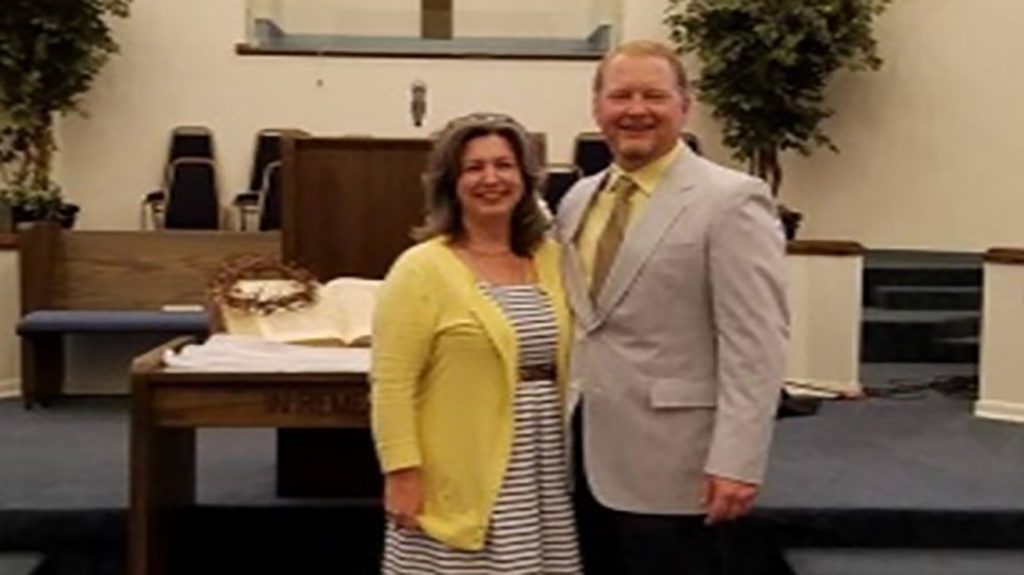Mark Duke and his Freedom Foundation partners have stirred up a lot of dust in Selma over the past couple of years. While the Web site for the foundation’s radio show (www.realtalkselma.com) says the group is working to “bring a sense of renewed hope and vision to the citizens of Selma,” many of the city’s longtime residents began questioning its background and “true agenda” after Duke’s sermons delivered in Colorado were discovered.
The foundation was started by The House of God (THOG, now Parker Community Church), a church founded by Duke in late 2001 to “restore God’s church” and continue the Spiritual Rights Movement a Georgia couple began.
In 2007, the foundation, which Duke serves as president, moved more than 50 members of THOG from Parker, Colo., to Selma and began hosting a radio show and undertaking numerous community service projects.
“Those who relocated are enthusiastic about being a part of the community and have given of themselves to the community,” states the foundation’s Web site, www.freedomfoundation.org. “Volunteers work in a variety of places throughout the city, such as the Selma City Schools, Dallas County Schools, Selma Police Department, YMCA, Dallas County Children’s Policy Council and downtown stores.”
While Allan McConnell, president of Radar13 Ministries in Birmingham, believes this community activity is good, he said Duke’s real beliefs and purpose are revealed in his messages.
“The House of God is a cult, and Mark Duke is the cult leader,” McConnell said. “From an evangelical Christian perspective, he preaches a different Jesus and a different gospel, and that is the biblical definition of what a cult is.
“His [sermons] are full of biblical inaccuracies, bad theology, bad doctrine, exclusivistic claims and separatist claims,” McConnell noted of tapes he was given of Duke’s sermons. “He definitely speaks out of both sides of his mouth. He doesn’t want the people of Selma or anyone else to know what he preaches.”
McConnell added, “Duke talks about his Baptist roots in at least one of these (sermons). In his sermons, he speaks of Baptist doctrine as ‘crappy,’ he suggests that Southeastern (Baptist Theological Seminary) should give him his money back and he makes the statement that he wouldn’t mind being baptized again because he was baptized into the devil’s army.”
Duke’s messages to the House of God congregation also shocked some longtime Selma residents because he made negative statements about black leaders. He called Selma civil rights attorney Rose Sanders “the devil” and said he does not respect Martin Luther King Jr. “as a Baptist preacher.”
“He does some good things in the community with the theater, and he has helped different organizations and has done things to help black churches,” Sanders said. “But he was helping black churches and demonizing the ministers, saying they were not doing things to help people. He came to Selma to run for mayor and save black people, but he has a great disdain for black people.”
When Duke and the foundation arrived in Selma, some members of the black community gave them the benefit of the doubt. But after hearing those tapes, “the vast majority of the black community is extremely skeptical of Mark Duke and the Freedom Foundation,” one black youth activist in Selma said. “It sounded like it came from a clear-set agenda versus a genuine place to improve Selma.”
McConnell said his suspicions about the foundation were aroused after he received more than 15 phone calls and e-mails from various Selma residents.
“This was not a collective effort,” McConnell said. “The vast majority of them were not making an assumption that something was wrong. They were just typical people who were saying something seems weird here … and wanted a professional to come in and assess it.”
So he traveled to Selma to meet Duke and requested information about the foundation by e-mail. After “two or three” interactions, McConnell was redirected to Julian McPhillips Jr., Duke’s attorney.
“Please address any concerns you may have about the Freedom Foundation to me,” McPhillips said in an e-mail to McConnell dated Sept. 10, 2008. “Please, however, understand that unless you are a governmental entity, we are under no obligation to answer your questions. … It may suit your fancy to demean or belittle others, like the Freedom Foundation, but if you attempt to tortiously interfere with the [foundation’s] business, I will take the legal steps necessary to protect my client.”
Kimesha Alvarado, a black radio show personality and host for Selma’s WBFZ, said she was also threatened with a lawsuit when she began expressing her concerns about Duke’s taped messages on-air.
“Any preacher … who puts his lawyer in the forefront is questionable,” Alvarado said. “Selma really does need help but not from people with hidden agendas because it ruins the trust and the actual need of the community. If you are here to help the community, you should be more open with the community. For you to be withholding information about your true mission, that’s strange.”
Although Duke admits that THOG “sent” some of its members to Selma, he contends he and his group are no longer affiliated with the Colorado church and the foundation is not a religious organization. “The Freedom Foundation does not have a doctrine,” Duke said. “It’s a community of volunteers that work for a nonprofit company.”
But McConnell said the radio show tells a different story.
“They say they are not a religious organization, but on their radio show, ‘Real Talk Selma,’ a large part of what they do is spout religious doctrine,” he said.
Yet Duke believes the theology issue is used as a plot to hide what he claims is the real problem — opposition to his outspokenness about segregation and oppression in Selma from neo-Confederates, racists and disgruntled former members of THOG, at least one of whom was also a founding trustee and volunteer of the foundation, according to McConnell.
“I’m one white minister that speaks a message that’s not common in Selma,” Duke said, describing himself as a person who speaks out against segregation.
Councilwoman Angela Benjamin, who is black, disagreed with his assessment of Selma. “We have to be careful about people coming to our town and telling us what is going on,” she said. “Selma African-Americans are not anymore oppressed than any African-Americans anywhere else. There is nothing … that is happening here that is not happening in … any other town in America. Oppression is oppression.”
Another issue raising concern about Duke’s ties to THOG is a recent building purchase for the Selma Community Church by two Colorado men. McConnell said both men are members of THOG and one was a founding trustee of the foundation. The Selma church’s pastor, Ronald Smith, is also one of Duke’s co-hosts on the radio show.
Duke said THOG “has not purchased anything in Selma” but admitted that Smith is “leasing his building through a couple guys that have an investment company” in Colorado.
But the aforementioned Selma youth activist believes Duke is really in control of the local church. “Ronald Smith is just a puppet, a black face behind Mark Duke, the puppeteer who holds the strings,” she said.
Still Duke contends the foundation is not a cult.
“I believe in America, a person should be innocent until proven guilty, but we have really taken a lot of unfair accusations to the point where I’ve had to hire one of the greatest civil rights attorneys, Julian McPhillips,” he said. “And it’s also the most unfair thing for our volunteers. … We’ve painted churches, done clothes drives, worked really closely with a lot of ministers in town. It’s been unfortunate to have some negativity.”
McConnell is not convinced.
“I am concerned about anybody that does some of the things that this guy does, and he tries to make it like everybody else is the bad person,” McConnell said. “When you hear a man preach in the pulpit, you are hearing his heart, what he truly believes. When you can’t be trusted for what you say in the pulpit, that is serious.”
For more information, visit www.wewillfindthetruth.com.





Share with others: